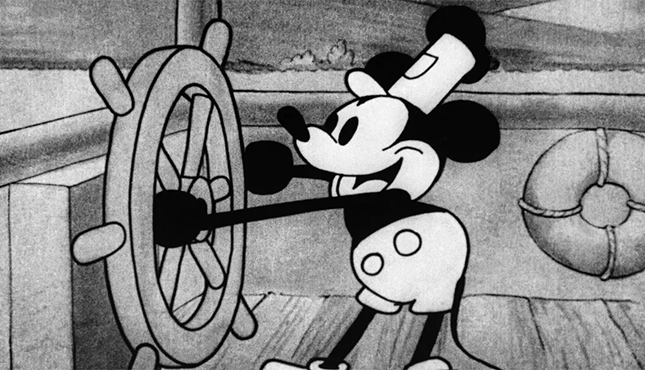Movies & TV / News
Steamboat Willie, The Man Who Laughs & More Enter Public Domain
 Image Credit: Disney
Image Credit: Disney
The proto-Mickie Mouse, Steamboat Willie, is among the properties that have entered the public domain in the new year. As Duke’s Center for the Study of Public Domain reports, the original iteration of the Disney icon has officially become public domain.
“Steamboat Willie” was a 1928 Disney short that featured the first versions of Mickey and Minnie Mouse. US copyright law stipulates that a work enters the public domain 95 years after it is published, which means that the short and its characters will be able to be used by current artists and creators. However, it does not mean that Mickey in general will be able to be used because many of his most well-known traits were not part of “Steamboat Willie.” These include his voice and the specific look that he developed after the short.
Disney has been notorious for protecting its copyrights, including on Mickey Mouse, and its trademarks and later copyrights still apply. Still, Steamboat Willie is one of the most prominent characters to enter public domain, and the character was among the reasons that Disney famously pushed for the 1998 Copyright Term Extension Act which extended the time before works would enter public domain. The Act was often derisively referred to as “the Mickey Mouse Protection Act” because of this.
A number of other works also entered public domain on January 1st, including:
* A. A. Milne’s House at Pooh Corner (featuring the introduction of Tigger)
* Virginia Woolf’s Orlando
* D.H Lawrence’s Lady Chatterley’s Lover
* J. M. Barrie’s Peter Pan; or the Boy Who Wouldn’t Grow Up
* The Cameraman (directed by Edward Sedgwick and Buster Keaton)
* The Circus (directed by Charlie Chaplin)
* The Passion of Joan of Arc (directed by Carl Theodor Dreyer)
* The Man Who Laughs (directed by Paul Leni; was an inspiration for the Joker)
* The Cameraman (directed by Edward Sedgwick and Buster Keaton)
* Bert Kalmar, Herbert Stothart and Harry Ruby’s “I Wanna Be Loved By You”
* Bertolt Brecht and Kurt Weill’s “Mack the Knife”







